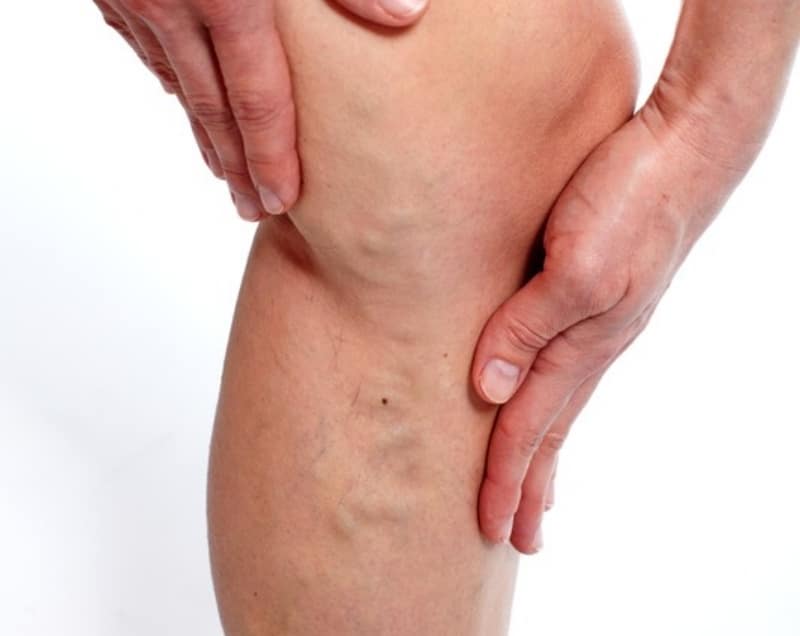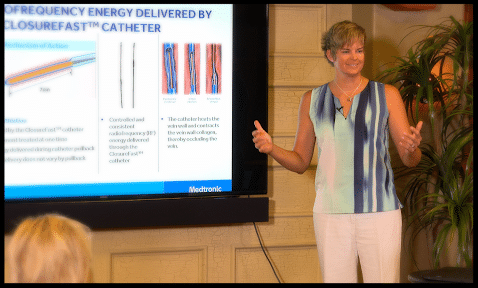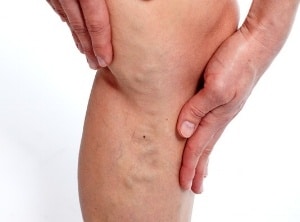Varicose Veins Symptoms That Can Save Your Life

In fact, varicose veins are so common that it can be easy to forget that they could also be an indication of more serious health issues lurking beneath the surface. That is why it is a good idea for anyone with even the slightest sign of venous disease, including varicose veins, to at least consult a vein specialist to see whether they are at risk for more serious conditions, such as chronic venous insufficiency (CVI), leg ulcers, or worse.
Varicose Veins Symptoms That Could Be Life Threatening
Not all symptoms hold the same weight, however. It is rare, but it is not impossible for clots to form in the visible veins and move into the deeper venous system.
If your leg suddenly swells and becomes painful, hard, hot, and red, or if you experience lightheadedness, rapid pulse or chest pain, seek medical help immediately. A leg that swells suddenly can be a sign of a blood clot (deep vein thrombosis); accompanying chest pain and lightheadedness could mean the clot has moved into your lungs (pulmonary embolism or PE), which can be fatal.
When is it Time to Consult a Vein Specialist For Your Varicose Veins?
While not immediately life threatening, it is still very important that you do not ignore these serious indications of chronic venous insufficiency. If left untreated, the condition could lead to leg ulcers or even dangerous blood clots. Seek treatment if your:
- Varicose veins bleed
- Legs bleed after minor injuries
- Skin around veins changes color
- Vein hardens
- Skin on ankle and calf becomes thickened and discolored
- Veins or legs become itchy, dry or scaly
- Visible sores or rash-like areas on the leg, or near the ankle
- Dull aching leg pain that interferes with your daily activities
- Persistent leg fatigue
- A family history of clot-related conditions
In Short, Don’t Ignore any Symptom of Varicose Veins
There are other more typical symptoms of varicose veins. Even seemingly harmless symptoms should not be ignored. It may happen slowly, but vein disease is always chronic and progressive.
- Visibly twisted and bulging veins
- Enlarged purple veins
- Itching of the skin around veins
- A feeling of heaviness in the legs which often gets worse when standing or sitting for extended periods
- Mild swelling of the feet and ankles
Stephanie M. Dentoni, MD, a vein disease expert who practices at the California Vein & Vascular Institute in Stockton, California, has treated several people who thought they didn’t have significant symptoms when they, in fact, did.
“…They have learned to live with the discomfort and think it's a normal thing,” says Dantoni. “For some, it’s only when they are asked specific questions about leg discomfort such as if their legs ached at the end of the day, if they have a little bit of swelling, if their legs feel better when elevated at the end of the day, that they discover there is an underlying problem with their vein health.”
Who Should I Consult if I am Concerned about my Varicose Veins?
Not all vein clinics offer the same kind of expertise. Clinics that focus on diagnosing and treating venous disease of the lower limb will have more experience treating your specific condition and can offer you the newest and most effective procedures available.
Phoenix, Arizona Vein Doctor Nurse Practitioner Jilanne Rose, of Advanced Vein Institute of Arizona, has successfully treated thousands of individuals with varicose veins, spider veins, leg ulcers, chronic venous insufficiency, and other venous problems of the lower limb. She cautions that there are some primary care physicians who may tell patients that their vein symptoms are nothing to worry about, or that there is no point to treatment because the symptoms will just come back.
“Consequently, patients will go years without vein treatment, and then encounter a serious problem that’s much more difficult to fix,” she notes, adding that diagnosis and treatment of vein disease has progressed a lot in the last few years.
“For anyone with symptoms of varicose veins, even without physical discomfort or pain, it’s safest to take the ‘prevention’ route and see a vein specialist,” she urges. “An exam and duplex ultrasound can detect early signs of varicose veins, even those that may not be visible to the human eye.”
To find out if you are at risk for chronic venous insufficiency, or any other venous disease of the lower limb, download and fill out this assessment.
Want to speak with someone right away? It's really easy to talk to Jilanne at our vein center. Just call the office or schedule now get a conversation started about your symptoms and whether vein treatment may be needed.
You May Also Like: How to find the Best Varicose Vein Clinic for your Vascular Health; Deep Vein Thrombosis blood clots can be deadly but are preventable; Treatments and Intervention for Venous Insufficiency
Is there anything worse than itchy varicose veins? Maybe, but itchy veins remains high on the list of issues we would love to resolve before they drive us crazy. If you are experiencing itching around your varicose veins, it could be a message from your body that it is time to have your veins checked…
Read MoreThe full story on Chronic Venous Insufficiency, what it is and how to treat it. A video presentation by Jilanne Rose, DNP-C, Clinical Director. Run Time 24:46. TRANSCRIPT What’s the Difference Between Veins and Arteries? When we talk about vascular health and vascular disease most people think about arteries. When we talk about the…
Read MoreA group of Gilbert Arizona Residents concerned about Chronic Venous Insufficiency gathered on Saturday July 16th for an interactive discussion on CVI symptoms, causes and treatments. Chronic Venous Insufficiency, Venous Reflux Disease and Varicose Veins affect over 30 million American men and women. Unfortunately, many do not get treated as they believe varicose veins are…
Read MoreCan Chronic Venous Insufficiency (CVI) be reversed? Unfortunately the short answer to this question is no; but CVI can be treated with minimally invasive procedures which can reduce symptoms and improve quality of life tremendously! Chronic Vein Insufficiency Causes In order to understand why venous insufficiency or peripheral venous insufficiency cannot be reversed, we must…
Read MoreWhat can you do to treat bleeding varicose vein and spider veins? First and foremost, don’t panic. Although the visual effect of a ruptured varicose vein or bleeding vein can be alarming, there are some simple things that can be done to get the bleeding to stop. If you can reach the area that is…
Read MoreWhy are varicose veins painful? The discomfort associated with varicose veins is caused by a combination of factors. When veins are weak, the blood which is supposed to return to the heart in a timely fashion, settles and pools in the superficial vein system. This pooling of blood worsens when patients stand or sit in…
Read MoreEndovenous Ablation Definition Taken literally, endovenous ablation is the removal of a vein from within. ‘Endo’ means internal or inside, ‘venous’ refers to a vein, and ablation is to ‘remove’. In the instance of veins, it is no longer necessary to physically remove a vein from the leg (vein stripping) to improve symptoms or the…
Read MoreThe newest procedure for the treatment of varicose veins was approved by the FDA about two years ago. It is what has been termed a non-tumescent non-thermal therapy. What this means is that it does not require a lot of numbing medicine to complete, and it does not use a heating element to close or…
Read MoreWhat is the best treatment for varicose veins? No varicose vein is the same; no person’s symptoms are the same; and so the best procedure for varicose veins is not always the same. The treatments associated with vein disease are based on a patient’s symptoms, vein size, location, contributing conditions, and ultrasound findings. Different…
Read More

